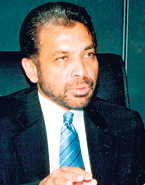| The Sri Lankan government continues to challenge U.N. Secretary-General Ban Ki-moon's right to appoint a panel of experts to advise him on the human rights situation - euphemistically called "accountability issues" – following the end of a protracted conflict against a secessionist group widely considered a terrorist organization.
"I am convinced it is well within my power as Secretary-General of the United Nations to ask such a body to furnish me with their advice of this nature," Ban told news reporters early this week.
"This does not in any way infringe on the sovereignty of Sri Lanka," Ban explained, responding to his critics. But the Sri Lankan government, strongly backed by the 118-member Non-Aligned Movement (NAM), is refusing to buy this argument.
In an interview with IPS U.N. Bureau Chief Thalif Deen, Sri Lanka's Permanent Representative to the United Nations Dr. Palitha Kohona said: "I believe the 118-strong NAM has made its point."
"Sri Lanka has resisted external pressure in the management of its internal affairs and the perception of Sri Lanka being singled out for harsh treatment must be avoided," he added.
In a letter to Ban last week, NAM expressed "deep concern" over the Secretary-General's unilateral decision to create the proposed panel, and accused him of two serious charges: attempting to violate the U.N. charter and trying to interfere in the domestic affairs of a member state.
The panel of experts was expected to advise the Secretary-General on "accountability issues" relating to post-conflict Sri Lanka, where the country's military has been accused of human rights violations and war crimes. The NAM letter also points out that neither the Security Council, nor the General Assembly, or its subsidiary Human Rights Council, have made any pronouncements on alleged human rights violations in Sri Lanka or mandated any particular course of action.
"Sri Lanka is confident that the Secretary-General will act consistently with the best interests of all concerned," said Dr Kohona, a former head of the U.N Treaty Section. Asked if he thought the Secretary-General had a legitimate right to name such a panel, he said: "I will not get involved in the legal intricacies of this question which, of course, could be the basis of another enlightening discussion."
"'We, nevertheless, recognize the need to address this issue in a manner that serves the best interests of Sri Lanka, the international community and the United Nations," he said.
Excerpts from the interview follow:
There are unconfirmed rumours that the Secretary-General is being pressured by some Western nations to take an unyielding stand against Sri Lanka. Any truth to this rumour?
A: I don't know. However, it would be strange indeed if any country were to exert pressure on the Secretary-General to penalize a small developing country which had almost single-handedly crushed a ruthless terrorist organization, and which success enjoys the widest support within the country, as clearly demonstrated by the unprecedented success of the government of President (Mahinda) Rajapaksa at a series of elections, when better documented violations of international humanitarian standards are occurring elsewhere, even as we speak.
Since the relationship between the United Nations and Sri Lanka continues to deteriorate, will the government permit a proposed visit to Colombo by U.N. Under-Secretary-General (USG) for Political Affairs Lynn Pascoe in the near future? If not, why?
A: I do not believe that the relationship with the U.N. is deteriorating. There are continuing discussions with the organization which is normal. This is not the first time that we have been engaged in this complex situation - and as a sovereign and equal member of the organization, Sri Lanka will continue to play its rightful role. We understand that USG Pascoe will visit Sri Lanka in due course following the invitation issued by the President.
The Western powers failed to get Sri Lanka on the Security Council agenda primarily due to opposition by China. But Beijing has caved in under Western pressure to approve three Security Council resolutions imposing sanctions on Iran, a country which has a much stronger political, economic and military relationship with China than Sri Lanka. Do you anticipate a situation when China will eventually relent to Western pressure on Sri Lanka - if not now, at least later?
A: In the light of what has been said above, it is unlikely that this matter would reach such a pass.
The NAM letter implicitly accuses the Secretary-General of playing politics when it says that the Non-Aligned countries "are of the conviction" that the proposal to appoint a panel of experts on the eve of parliamentary elections in Sri Lanka "could do more harm than good to the country's ongoing and relentless efforts aimed at reinforcing reconciliation and national unity." Is he?
A: Sri Lanka has always had the highest regard for the Secretary-General and acknowledges the difficult task that he is performing in the service of the organization. We are confident he will act in a manner that will not inflame the political sensitivities in the country, especially in the lead-up to a general election (in Sri Lanka in early April).
How negative is the reaction in Sri Lanka to the U.N. proposal to appoint a panel? And if permitted, could the Secretary-General's decision be a precedent for similar action elsewhere?
A: The reaction within Sri Lanka to comments made by the Secretary-General and his spokesman, as underlined in a statement issued by the foreign ministry, is, unfortunately, extremely negative. We also have a recently re-elected president who is enjoying unprecedented approval ratings.
All parties need to reflect on the political consequences of the course of action currently being discussed and remind ourselves of the importance of permitting Sri Lanka the space to address its internal issues without the irritant of external interference which could also be precedent-setting in a global sense. I note that an accountability mechanism has already been outlined by the Attorney General (of Sri Lanka) before the Human Rights Council.
| 

